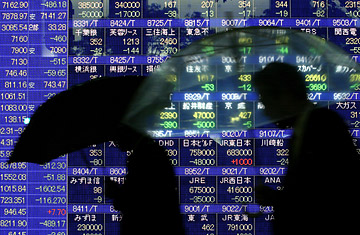
People walk past an electronic board showing share prices on October 27, 2008 in Tokyo, Japan.
Another day, another pounding on international equity markets. Investors in Asia and Europe continued the frenzied dumping of stocks that has marked the past few weeks, pushing some indices to lows not seen in years. As was the case in earlier sell-a-thons, no one seems to have a clue when the brutal slide might end.
Worst hit Monday was Tokyo's Nikkei index, whose 6.4% slide to 7,162.9 points marked its lowest level since 1982. Hong Kong's Hang Seng was down 12.7%, its biggest single-session drop in 17 years. Other Asian indices suffered more modest declines, but all were down besides South Korea's Kospi, which was up a modest 0.8% due mostly to an interest rate cut.
Europe fared no better during the initial hours of trading, with London's FTSE 100 at one point dropping 5.6% to its lowest mark since April, 2003. In Paris, France's CAC 40 plunged 5.4%, while Germany's Dax was down 3.3%. Things looked set to begin just as bad in New York, meanwhile, with Dow Jones futures trading 3.2% down, in line with Friday's drop of 3.6%.
The reason for Monday's market plummet is little changed from that behind the last few weeks of red ink: Growing certainty that the world is headed into a deep, and probably long, recession. The pessimism is fuelled by statistics showing consumer spending and industrial production falling off in many major economies, and especially in the U.S.
Company results and announcements out today will further darken the picture. In France, for example, the country's two major automobile manufacturers — Renault, and the PSA group that makes Peugeot and Citroën cars — said they will temporarily close all their domestic factories this week, and have asked employees to stay away on paid leave in response to shrinking demand. Germany's Ifo Institute, meanwhile, said its primary activity index, which measures industry and trade activity, fell to a five-year low last month.
The U.S. currency continued gaining ground on the euro and British pound Monday, while a surging Japanese yen caused more trouble for Japan's export-reliant economy. That prompted the G7 to issue a statement that member nations would undertake collective efforts to undercut the value of the yen to limit the economic damage its rise has inflicted on Japan.
Efforts to counter the crisis focused on Eastern Europe as well. The International Monetary Fund announced that it has struck a tentative accord to lend $16.5 billion to cash-strapped Ukraine, and said a major impediment to providing emergency funding to Hungary had also been removed. In Asia, meanwhile, the central banks of Australia and Hong Kong safeguarded the liquidity of markets with new injections of funds, while South Korea cut its key interest rate by three-quarters of a point in the hopes of countering slowing economic growth.
But none of those efforts have yet helped boost global markets, where investor sentiment seems set. During an online chat Monday on the site of Spanish daily El Pais, the European Union's Economic and Monetary Affairs Commissioner Joaquin Almunia said he thought the uncertainty currently rattling markets could linger on for another year.
